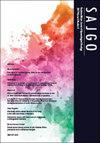Palliative chemotherapy in recurrent carcinoma cervix: experience from a regional cancer centre in southern India
IF 0.1
Q4 OBSTETRICS & GYNECOLOGY
Southern African Journal of Gynaecological Oncology
Pub Date : 2016-04-07
DOI:10.1080/20742835.2016.1175152
引用次数: 1
Abstract
Aims: To evaluate the clinical outcome and complications with two different palliative chemotherapy regimens in recurrent cervical carcinoma. Methods and materials: Forty (40) women with recurrent cervical squamous cell carcinoma were treated with palliative chemotherapy using paclitaxel plus cisplatin or single-agent docetaxel. Clinical outcome and toxicities were analysed. The parameters in two arms were compared using Student’s t-test and statistical analysis was done using R software. Results: At a median follow up of 1.35 years the clinical outcome was complete response/partial response in 50% and 60% and progressive disease in 20% and 10% of the patients with either paclitaxel/cisplatin or docetaxel, respectively, which was not statistically significant. Stable disease (SD) was 30% in both arms. Toxicity included nausea, seen in all the patients in both arms, and diarrhoea, seen in 90% and 70% of the patients in the two arms, respectively. Grade II to III neutropenia was seen in 10% of patients with paclitaxel/cisplatin and none with docetaxel. Hypersensitivity was encountered in 40% and 30% in the two arms, respectively. Conclusion: There was no significant difference in clinical outcome and morbidity in patients with either paclitaxel/cisplatin or single-agent docetaxel. Further prospective clinical trials with larger study groups and longer follow-up are required to substantiate these claims.姑息性化疗治疗复发性宫颈癌:来自印度南部地区癌症中心的经验
目的:评价两种不同姑息性化疗方案治疗复发性宫颈癌的临床疗效及并发症。方法与材料:对40例复发性宫颈鳞状细胞癌患者行紫杉醇联合顺铂或单药多西他赛姑息性化疗。分析临床结果及毒副反应。两组参数比较采用Student’s t检验,采用R软件进行统计分析。结果:中位随访1.35年,临床结果分别为50%和60%的紫杉醇/顺铂或多西紫杉醇患者完全缓解/部分缓解,20%和10%的患者病情进展,无统计学意义。两组患者病情稳定(SD)为30%。毒性包括恶心,在两组的所有患者中都出现,以及腹泻,分别在两组的90%和70%的患者中出现。10%的紫杉醇/顺铂组患者出现II至III级中性粒细胞减少,而多西紫杉醇组无。两臂分别有40%和30%的患者出现超敏反应。结论:紫杉醇/顺铂组与单药多西他赛组的临床结局和发病率无显著差异。进一步的前瞻性临床试验需要更大的研究组和更长时间的随访来证实这些说法。
本文章由计算机程序翻译,如有差异,请以英文原文为准。
求助全文
约1分钟内获得全文
求助全文
来源期刊

Southern African Journal of Gynaecological Oncology
OBSTETRICS & GYNECOLOGY-
自引率
0.00%
发文量
0
审稿时长
24 weeks
 求助内容:
求助内容: 应助结果提醒方式:
应助结果提醒方式:


